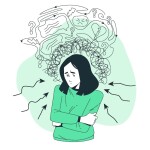Happiness and emotional health are fundamental aspects of human existence. They shape how we connect with others, respond to challenges, and navigate our lives. But what makes us happy? Why do certain emotional experiences persist across cultures and generations? While neuroscience and psychology ask these questions, the answer is richer when viewed through an evolutionary lens. Inspired by Charles Darwin's insights, this blog examines the biological mechanisms, psychological adaptations, and cultural influences that have shaped our understanding of happiness and emotional health.
Introduction: The Evolutionary Perspective on Emotions
Charles Darwin was a scientist whose theory of natural selection is best known, yet he also provided much towards understanding emotions. In his book The Expression of the Emotions in Man and Animals, Darwin argued that emotions evolved for adaptive functions to further survival and reproduction.
Happiness, like any other emotion, is not just a meaningless state of affairs but an adaptation. The positive emotions of joy and contentment, for example, strengthen the behaviors that further well-being, social bonding, and resource acquisition. Fear and anger, though less pleasant, help humans to avoid dangers and protect their interests. Together, these emotional states form a dynamic system supporting survival in complex environments.
The Biological Blueprint of Happiness: Dopamine, Serotonin, and Beyond
The brain is where happiness truly lies, as a set of chemicals and circuits over millennia fine-tuned for adaptive behavior.
1. Dopamine: The Motivation Molecule
Dopamine is an important neurotransmitter that mediates the brain's reward system. It fires when a person anticipates or acquires something rewarding, such as food or social bonding.
From the perspective of evolution, dopamine prompted early humans to search for resources, explore new territories, and overcome obstacles. This reward system ensured survival and the perpetuation of the species. However, in the present world, this system is hijacked by instant gratification, such as social media notifications or junk food, leading to an imbalance in our pursuit of happiness.
2. Serotonin: The Mood Stabilizer
Serotonin regulates mood, appetite, and sleep, contributing to a sense of well-being. Evolutionarily, serotonin helped humans remain calm and focused, even in stressful situations, enabling better decision-making and problem-solving.
3. Endorphins: The Natural Painkillers
Endorphins are secreted by physical exercise, stress, or laughter, giving an individual a euphoric feeling and a diminished pain threshold. For our forefathers, endorphins helped them endure long hunts or injuries because of the pain-reducing effect and maintaining motivation.
4. Oxytocin: The Bonding Hormone
Oxytocin promotes trust, intimacy, and social bonding. Most importantly, it plays a highly important role in the relationships between parents and their children as well as in romantic bonding. From an evolutionary viewpoint, oxytocin would have enhanced group cohesiveness and ensured the survival of offspring, thereby providing a foundation for human social behavior.
While the capacity for emotions is essential, equally critical is the ability to regulate them. Emotional regulation allows humans to balance competing needs, such as immediate survival versus long-term well-being.
1. Fear and Anxiety: Fear was developed in response to real-time threats, such as predators or snakes, whereas anxiety helped avoid potential threats. These emotions kept the ancestors alert and prepared for challenges.
2. Happiness and Satisfaction: Joy and contentment served as reinforcers of positive emotions, rewards for reaching goals. Such behavior would be forming alliances or obtaining shelter. Contentment specifically prompted early humans to withhold resources and energy when there was a positive environment.
3. Social Emotions: Emotions such as guilt, shame, gratitude, and pride are uniquely human adaptations that foster social cohesion. For instance, guilt discourages harmful actions, while gratitude strengthens relationships. These emotions ensured harmonious group living, which was essential for survival.
Psychological Adaptations: Evolved Mechanisms for Happiness
Beyond biology, our psychological makeup has evolved to maximize happiness and emotional health.
1. The Hedonic Treadmill: Humans have an innate capacity for adapting to changes in circumstances in order to quickly return to some baseline level of happiness, which is known as hedonic treadmill. This effect ensured that early humans maintained their motivation after having managed to attain a goal, including finding food, and could not become complacent:
2. Cognitive Biases: Optimism bias, or the tendency to overestimate the likelihood of positive outcomes, encouraged risk-taking and perseverance in uncertain situations. Negativity bias, which prioritizes potential threats, helps humans avoid dangers. Together, these biases balance risk and reward in decision-making.
3. Social Connectivity: Humans are social beings by nature, and relationships formed are the very basis for happiness. From an evolutionary point of view, close bonding established safety, resource sharing, and support for emotions. The happiness established through social connections made people cling to these relationships, thus bolstering group dynamics.
While our systems of biology and psychology evolved to meet the needs of our ancestors, modern life presents unique opportunities and obstacles of happiness.
1. Mismatch Between Evolutionary Needs and Modern Life:
Many aspects of modern life exploit our evolutionary predispositions. For instance, the abundance of calorie-dense foods conflicts with dopamine-driven reward pathways, contributing to overeating. Similarly, social media exploits our need for connection but can lead to feelings of isolation and inadequacy.
2. Cultural Practices and Happiness:
Despite these challenges, cultural evolution has introduced practices that align with our evolved mechanisms for emotional well-being.
For example: Mindfulness and Meditation can neutralize some of the stress in contemporary living and develop emotional resilience and resilience. Gratitude Practice Encourage feelings of gratitude for those relationships in which there are significant interactions, aligning more with evolutionary requirements. Festival activities, worship functions, and community ceremonies evoke release of oxytocin in strengthening bonding of people as an entity and promoting well-being for each individual involved.
Darwin's Legacy: Implications for Emotional Health Today
Understanding the evolutionary roots of happiness offers practical insights into enhancing emotional health in the modern era.
1. Positive Habits:
- Physical activity should be maintained as a regular activity to elevate endorphins.
- Good relationships should be maintained to release oxytocin.
2. Adaptation to Modern Challenges:
- Reduce excessive exposure to technology that manipulates dopamine.
- Engage in things that provide lasting fulfillment instead of short-term pleasure.
3. Enhancing Emotional Regulation:
- Mindfulness counters the negativity bias.
- Learn to accept and rise with the natural flow of emotions.
Conclusion: Emotional Health in Evolution
Happy and emotionally healthy are words that are not abstract. They are deeply rooted as part of our evolutionary past. Darwin reminds us that it is through emotions that a survival and reproduction advantage developed, which has shaped the form in which we experience happiness today.
Understanding the interplay of biological mechanisms, psychological adaptations, and cultural influences allows us to align our modern lives with the principles that have guided humanity for millennia. Happiness, in this sense, is not only a personal pursuit but a shared journey, reflecting our collective evolution as a species.
This evolutionary perspective will guide us as we make informed choices and adapt to a world of changing dynamics. With science and self-awareness, we can pay homage to our past and evolve into a better, healthier future.
Solh understands. We offer a variety of features to help you invest in self-care and stress management.
Journaling for Self-Reflection: Sometimes, failure to care for oneself is the inability to understand oneself. Solh's journal feature provides you with space to express your thoughts and feelings. Reflecting on your experiences and desires is like discovering what stops you from self-care.
Anonymous Support Groups: You are not alone. Solh's anonymous support groups connect you to others who know exactly what the hassle is all about. Share your experiences, find comfort in solidarity, and discover new perspectives on overcoming the hurdle to indulge in self-care.
Solh Buddy: Ever feel lost in the woods or wholly disconnected? Your Solh Buddy is here for you- personalized, virtual support. It can give you prompts, celebrate your wins, and remind you of your strengths as you journey toward self-care.
Talk now: Sometimes dealing with Violence is overwhelming. Through Solh's Talk Now feature, access counselors who will walk you through those moments.
Solh believes in a unique way of introducing self-care. We empower you to take charge of your well-being by offering a variety of tools. Explore Solh today and discover the power of self-reflection, connection, and support in overcoming any problem of the mind. You're not alone on this path.
Balance Your Life with the Solh App
With the Solh App, wellness got easier. An innovative addition called Streffie, a stress monitor, helps you identify and measure perceived and actual stress levels. The app empowers you to take control of your mental well-being, prioritize self-care, and maintain a healthy work-life balance with actionable insights from Solh.
Download the Solh App and take the first step to a stress-free, balanced life!








